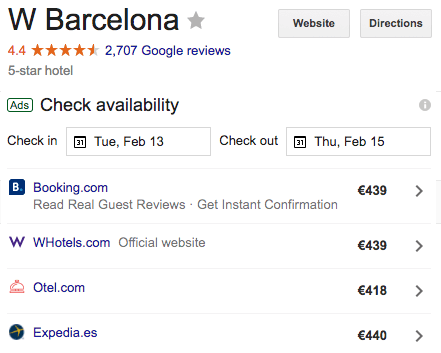
With barely any opposition from hotels, Booking.com is taking big steps to continue growing and capturing sales for your hotel which are currently coming in through other channels, including your own website. Get ready, whether you like it or not, to see your Genius rates on metasearch engines.

Why and to whom do you pay commissions?
As a hotelier, you are ready to pay a commission so that Booking.com -or any other channel- generates new sales for you. In other words, it captures clients that you otherwise would not have been able to attract to your hotel. The conflict arises when a sale generated somewhere else -”client who chooses your hotel whilst browsing on TripAdvisor” or “friend who recommends your hotel to someone else”- ends up on Booking.com and you end up paying a commission that you shouldn’t have.
The classic example of searching for your hotel name on Google, where intermediation generates no value, but it refuses to be withdrawn despite you wanting it to. It’s a lost battle that some hotel chains are starting to bounce back from.

More recently, OTAs also won the battle of metasearch engines, where once again they bid on your name without offering the option of withdrawing it despite you begging for it.

Their response towards your pleas is “it’s in the contract”, although they may sugar-coat it with other banal and nonsensical reasons which deter or confuse many hoteliers.
At the end of the day, if I were Booking.com, I wouldn’t remove my advertisements for your name on AdWords or on metasearch engines. Doing so would result in a decline in my sales of between 30% and 50%, so why do it? What would I gain in exchange?
Booking Genius
A few years ago, Booking.com launched its Booking Genius programme to build customer loyalty among its clients -with you picking up the tab, of course-. It was a brilliant move with some short-term attractions but incredibly negative consequences in the long run. It’s a “slow-motion suicide” which, at Mirai, we openly recommend that you leave Genius before it’s too late.




